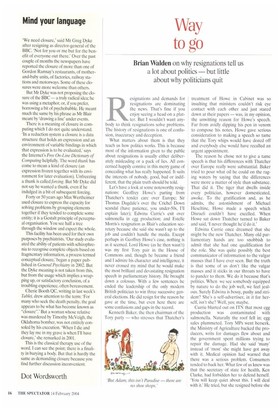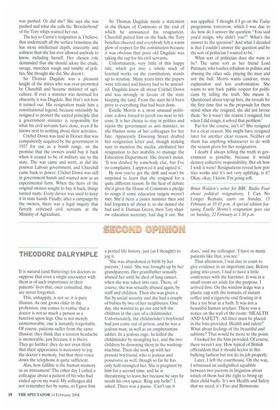Way to go
Brian Walden on why resignations tell us a lot about politics — but little about why politicians quit Resignations and demands for resignations are dominating the news. That's fine if you enjoy seeing a head on a platter. But I wouldn't want anybody to think resignations solve problems. The history of resignations is one of confusion, inaccuracy and deception.
What matters about them is that they teach us how politics works. This is because most of the information given to the public about resignations is usually either deliberately misleading or a pack of lies. All concerned happily connive in this merry game of concealing what has really happened. It suits the interests of nobody, good, bad or indifferent, that the plain truth should be told.
Let's have a look at some noteworthy resignations: Geoffrey Howe's parting from Thatcher's tender care over Europe; Sir Thomas Dugdale's over the Crichel Down scandal (have patience, you under-50s, I'll explain later); Edwina Currie's exit over salmonella in egg production; and Estelle Morris's resignation as Blair's education secretary because she said she wasn't up to the job and couldn't handle the media. Except perhaps in Geoffrey Howe's case, nothing is as it seemed. Lord Howe (as he then wasn't) was my first Tory pair in the House of Commons and, though he became a friend and I admire his character and intelligence, it never crossed my mind that he would make the most brilliant and devastating resignation speech in parliamentary history. He brought down a colossus. With a few sentences he ended the leadership of the only modern British politician to win three successive general elections. He did resign for the reason he gave at the time, but even here there are some confusions and gaps in the record.
Kenneth Baker, the then chairman of the Tory party — who stresses that Thatcher's treatment of Howe in Cabinet was so insulting that ministers couldn't risk eye contact with each other and just stared down at their papers — was, in my opinion, the unwitting reason for Howe's speech. Far from avidly dipping his pen in venom to compose his notes. Howe gave serious consideration to making a speech so tame that the Tory whips would have dozed off and everybody else would have recalled an urgent appointment.
The reason he chose not to give a tame speech is that his differences with Thatcher over Europe really were substantial. Baker tried to pour what oil he could on the raging waters by saying that the differences were more a matter of style than substance. That did it. The tiger that dwells inside every politician, however domesticated, awoke. To the gratification and, as he admits, the astonishment of Michael Heseltine, Howe made a speech which Disraeli couldn't have excelled. When Howe sat down Thatcher turned to Baker and said, 'I never thought he'd do it.'
Edwina Currie once dreamed that she might be the new Thatcher. Many old parliamentary hands are too snobbish to admit that she had one qualification for the role. She was quite possibly the best communicator of information to the vulgar masses that I have ever seen. But the truth is that some of us don't like the vulgar masses and it sticks in our throats to have to pander to them. We do it because that's politics. When we see somebody equipped by nature to do the job well, we feel jealous. Surely Edwina is bossy, pushy and strident? She's a self-advertiser, in it for herself, isn't she? Well, yes; maybe.
Currie blurted out on ITN that most egg production was contaminated with salmonella. Naturally the roof fell in; egg sales plummeted, Tory MPs went berserk, the Ministry of Agriculture backed the producers, writs for damages flew about and the government spent millions trying to repair the damage. Had she said 'many' instead of `most' she might have got away with it. Medical opinion had warned that there was a serious problem. Consumers tended to back her. What few of us knew was that the secretary of state for health, Ken Clarke, had forbidden her to defend herself. 'You will keep quiet about this. I will deal with it.' He tried, but she resigned before she was pushed. Or did she? She says she was pushed and what she calls the 'Broederbond' of the Tory whips wanted her out.
The key to Currie's resignation is, I believe, that underneath all the surface brassiness she has more intellectual depth, insecurity and softness than she has ever allowed anybody to know, including herself. Her chosen role demanded that she should adore the crude, savage, merciless rough and tumble of politics. She thought she did. She doesn't.
Sir Thomas Dugdale was a pleasant knight of the shires who was over-promoted by Churchill and became minister of agriculture. If ever a minister was destined for obscurity it was Dugdale. But that's not how it turned out. His resignation made him a constitutional legend, because ostensibly he resigned to protect the sacred principle that a government minister is responsible for what his civil servants have done, even if he knows next to nothing about their activities.
Crichel Down was land in Dorset that was compulsorily acquired by the government in 1937 for use as a bomb range, on the promise that the owners could buy it back when it ceased to be of military use to the state. The war came and went, as did the postwar Labour government, and Churchill came back to power. Crichel Down was still in government hands and wanted now as an experimental farm. When the heirs of the original owners sought to buy it back, things turned nasty. Every device was used to keep it in state hands. Finally, after a campaign by the owners, there was a legal inquiry that fiercely criticised civil servants at the Ministry of Agriculture. Sir Thomas Dugdale made a statement in the House of Commons at the end of which he announced his resignation. Churchill patted him on the back, the Tory benches cheered and everybody felt a warm glow of respect for the constitution because it was obvious that poor old Dugdale was taking the rap for his civil servants.
Unfortunately, very little of this happy tale, which got into a whole stack of learned works on the constitution, stands up to scrutiny. Many years later the papers were released and history had to be amended. Dugdale knew all about Crichel Down and was strongly in favour of the state keeping the land. From the start he'd been privy to everything that had been done.
Estelle Morris is a most unusual politician: a dove forced to perch too near to falcons. It is her choice to stay in politics and rejoin the government as arts minister, so she blames none of her colleagues for her fate. Apparently Downing Street drafted her resignation letter and, though making sure to mention the media, attributed her resignation to her inability to manage the Education Department. She doesn't moan. 'It was drafted by somebody else, but I've no complaints. I approved it and signed it.'
By now you've got the drift and won't be surprised to learn that she resigned for a quite different reason. In the heat of debate she'd given the House of Commons a pledge to resign if some education targets weren't met. She'd been a junior minister then and had forgotten all about it, so she denied she had said it. Damian Green, then Tory shadow education secretary, had dug it out. She was appalled. 'I thought if I go on the Today programme tomorrow, which I was due to do, how do I answer the question "You said you'd resign, why didn't you?" What's the answer to the question? And what I decided is that I couldn't answer the question and be the sort of politician I wanted to be.'
What sort of politician does she want to be? The same sort as her friend Lord Puttnam, who loathes tribalism in politics and abusing the other side, playing the man and not the ball. Morris wants candour, more explanation and less confrontation. She wants to win back public respect for politicians by telling the truth. She means it. Questioned about top-up fees, she reveals for the first time that as the proposals for them stood when she resigned, she did not favour them. `So it wasn't the reason I resigned, but when I did resign, it solved that problem.'
Par for the course, isn't it? She resigned for a clear reason. She might have resigned later for another clear reason. Neither of them has anything whatsoever to do with the reason given for her resignation.
I doubt if always telling the truth in government is possible, because it would destroy collective responsibility. But oh how I wish it were! Resignations reveal how politics works and it's not very uplifting, is it? Okay, okay, I know. I'm going soft.
Brian Walden's series for BBC Radio Four about political resignations, I Can No Longer Remain, starts on Sunday, 15 February at 10.45 p.m. A special edition featuiing Estelle Morris's resignation goes out on Sunday, 22 February at 1.30 p.m.



































































 Previous page
Previous page